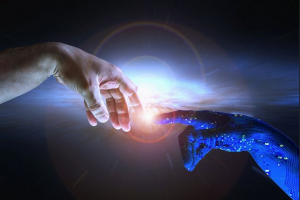CNA—The Society of Catholic Scientists (SCS) will hold its 2021 conference in Washington D.C. on the subject of non-human intelligence.
The conference is titled “Extraterrestrials, AI, and Minds Beyond the Human” and will take place at the Hilton Hotel from June 4-6. The event will also be live-streamed.
Conference discussions will provide scientific and theological insights on the subjects of real and hypothetical intelligences, especially extraterrestrial and artificial intelligences.
“There’ll be 13 talks. Half of the talks are going to be about extraterrestrial life, and there’s going to be talks by some big experts on that subject,” Dr. Stephen Barr, president of the Society of Catholic Scientists, told CNA.
Four of the invited speakers will discuss the possibility of extraterrestrial life from their respective fields of study – astrophysics, astrochemistry, evolutionary biology, and Catholic theology.
The speakers will include Jonathan Lunine, director of the Cornell Center for Astrophysics and Planetary Science; Karin Öberg, professor of Astronomy and director of Undergraduate Studies at Harvard University; Simon Conway Morris, chair of Evolutionary Palaeobiology at the University of Cambridge; and Christopher Baglow, director of the Science and Religion Initiative of the McGrath Institute for Church Life of the University of Notre Dame.
“[Öberg is] a rising star at Harvard, a tenured professor there, she’s also a convert to the Catholic Faith. She is an expert on biochemistry that goes on in other planets,” Barr said. “There’s a lot of excitement because in recent years astronomers have discovered large numbers of planets orbiting other nearby stars. They could learn a lot about these planets – how far they are from the star, how big the planet is, even things about the chemistry of the planet in some cases.
During the conference, the St. Albert Award Lecture will be issued by Lawrence Principe, professor of the Humanities at Johns Hopkins University.
The conference will also include two Poster Sessions – one for presentations on the conference’s theme and another for presentations on topics such as the correlation between science and faith.
Barr said the SCS conference provides an open forum for reflections on the intersection between science and the realms of theology and philosophy. He said the goal of the conference is the same as the goal of the Society of Catholic Scientists more generally – to foster community among Catholic scientists and to be a witness to the world. He emphasized the importance of promoting a successful collaboration between science and faith.
“[It’s] very important nowadays because there are many people out there who think that science and faith are incompatible,” he said.
“I think if people see that there’s a large organization of a large number of scientists, [who are] devout, practicing Catholics, I think it has a witness value and is stronger evidence for people in the science department.”
Founded in 2016, the society began with only six members and now has over 1400 scientists, students, and other intellectuals in over 50 countries.
The organization provides mentors and role models for young Catholics studying science or mathematics. It also provides resources for pastors, laity, educators, journalists, and the general public.



You must be logged in to post a comment.